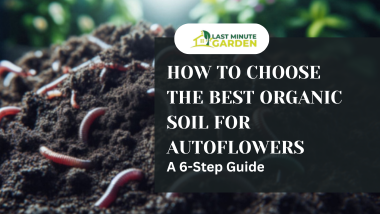Achieving a high-yield auto-flowering harvest starts with the right foundation—premium organic soil packed with nutrients, microbes, and balanced pH.
Autoflowering cannabis plants, known for their quick growth cycles and resilience, thrive when grown in soil specifically suited to their unique needs. You need the best organic soil for autoflowers.
A carefully selected organic soil will help auto flowers flourish from seedling to harvest, supporting healthy root development, strong stems, and abundant bud production.
Below is a detailed six-step guide to help you choose and prepare the best organic soil for autoflowers plants.
Step 1: Choose Well-Draining, Aerated Soil
The best organic soil for autoflowers requires soil that strikes a balance between moisture retention and drainage. Unlike heavy, compacted soil, a well-aerated mix keeps roots oxygenated and prevents waterlogging that can lead to root rot.
Look for soil with a light, fluffy texture, often achieved by adding perlite or vermiculite to maintain optimal structure.
When choosing soil, avoid clay-heavy varieties. Instead, opt for a loose, airy composition, which ensures roots can expand without restriction. Well-draining soil also lowers the risk of pest and mold issues, creating a healthier environment for your plants.
Step 2: Enrich the Soil with Organic Matter
Organic matter like compost, worm castings, or aged manure provides slow-release nutrients and enhances the soil’s overall structure.
These organic additives are vital for auto flowers, as they break down over time to supply steady nourishment, reducing the need for frequent fertilization.
Adding compost brings essential macronutrients (nitrogen, phosphorus, potassium) and micronutrients, while worm castings introduce beneficial bacteria that aid nutrient absorption.
Aim for around 20-30% organic matter in your soil blend to create a nutrient-dense base that promotes robust growth.
Step 3: Adjust the pH to Around 6.0
A pH of around 6.0 is ideal for autoflowers, as it optimizes nutrient uptake. Organic soils sometimes vary in pH, depending on their composition, so it’s essential to test and adjust accordingly.
Use a soil pH tester to check the acidity, and adjust with dolomite lime if necessary to increase pH or sulfur to decrease it. Balanced pH reduces nutrient lockout, ensuring that autoflowers receive all necessary nutrients during each growth stage.
Keeping a close eye on pH, especially during the early growth phases, will set your plants up for success and prevent issues that may be challenging to correct later on.
Step 4: Add Beneficial Microbes
Microbial life in organic soil supports auto-flowering plants by breaking down organic material and making nutrients more accessible to roots.
Mycorrhizal fungi, for example, form symbiotic relationships with plant roots, enhancing nutrient uptake and bolstering plant resistance to stress. Adding microbial inoculants to your soil mix enhances root health and boosts resilience.
Incorporate microbes through worm castings, compost teas, or mycorrhizal fungi powder directly into the soil.
The added microorganisms create a “living soil” environment where plants thrive naturally with minimal intervention, supporting vigorous growth and higher yields.
Step 5: Use Nutrient Supplements Wisely
Autoflowers have a shorter lifecycle than photoperiod plants, making it essential to provide nutrients in forms that don’t risk root burn. While some growers choose synthetic fertilizers, organic growers favor a lighter hand to avoid overwhelming their plants.
Supplements like bone meal and blood meal deliver key nutrients—phosphorus, calcium, and nitrogen—without excess salts that might harm autoflowers.
Incorporate these nutrients sparingly and monitor plant responses to avoid deficiencies or excesses.
Organic supplements typically break down slowly, which suits the rapid growth of auto flowers while minimizing the risk of nutrient burn and keeping the soil ecosystem balanced.
Step 6: Maintain Moisture with Mulch
Maintaining adequate moisture levels is essential for the health and productivity of autoflower plants. One effective strategy is to apply a layer of mulch, such as straw, shredded leaves, or wood chips, around each plant.
Mulch acts as a protective barrier, preventing the soil from drying out quickly and stabilizing soil temperature, which creates an ideal environment for the plants to thrive.
A 2-inch layer of mulch around each plant helps reduce the rate of evaporation, ensuring that the roots remain consistently hydrated between waterings. This is especially beneficial in hot weather, as it reduces the frequency of watering, saving time and preventing moisture stress.
Additionally, mulching suppresses weed growth, which means fewer weeds compete for nutrients and water, leaving more resources for your plants. Mulching also protects the organic structure of the soil, helping it retain nutrients and stay healthier over time, resulting in stronger, more resilient plants.
Final Thoughts on the Best Organic Soil for Autoflowers
Creating the best organic soil for autoflowers is an investment in a high-quality yield. Following these six steps, you’ll set your plants up for optimal growth with nutrient-dense, well-balanced soil that meets their unique requirements.
The best organic soil for autoflowers responds well to well-draining, aerated soil enriched with organic matter, beneficial microbes, and controlled pH.
Add light organic nutrient supplements and maintain moisture with mulch, and you’re on the path to healthy, productive auto-flowering plants.
Happy growing!





